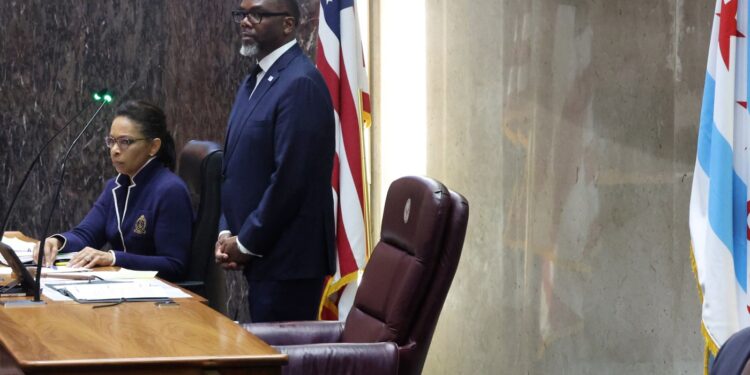
Ratings agency S&P downgraded the city of Chicago’s general obligation debt late Monday, citing structural imbalance in the just-passed 2025 budget, limited options for new revenue down the line and a lack of willingness among city leadership to cut spending.
S&P analyst Scott Nees said in a release that Mayor Brandon Johnson’s 2025 budget left a “sizable structural budgetary imbalance that we expect will make balancing the budget in 2026 and outyears more challenging.”
A downgrade isn’t only a reputational hit; it could also increase the city’s cost to borrow money for long-term projects like Johnson’s $1.25 billion housing and development bond, which is slated to go to market early this year.
The city’s chief financial officer, Jill Jaworski, disagreed with the downgrade and said in a release that the rating does not “accurately reflect the strength of the City’s credit,” or its ability to meet steep debt and pension obligations.
S&P had put the city on credit watch in November, warning leaders not to abandon a key long-term pension reform or rely too heavily on one-time fixes to plug its budget gap. While the mayor ultimately opted to maintain the supplemental pension policy started under predecessor Lori Lightfoot, chipping in $272 million to the city’s pension funds, his overall spending plan did not resolve the city’s long-standing fiscal problems, the agency concluded.
In the release, Johnson said the S&P decision “does not accurately reflect our fundamental economic strength and the steps we’ve taken to address legacy issues.”
“My administration remains committed to working collaboratively with the City Council to achieve structural balance and strengthen Chicago’s financial future,” he said in the release.
He cited a slew of major projects like the quantum computing campus on the city’s South Side, new development surrounding the United Center, and the expansion of the CTA Red Line.
“We will meet these challenges head-on, just as Chicago has always done and we will engage with all stakeholders to create sustainable policies that reflect our shared commitment to progress and accountability,” Johnson said in the release.
The BBB rating means the city has “adequate capacity to meet financial commitments,” according to S&P, but that the agency views the city as more susceptible to “adverse economic conditions.”
BBB is a step above the lowest investment-grade, BBB-, which is still a notch above junk.
Johnson’s budget director, Annette Guzman, said structural reforms to the city’s budget would take time and last month argued against a downgrade.
Shortly after the budget’s passage, ratings agency Fitch and other financial experts credited the city with preserving the extra payments to keep its pension funds afloat. They also noted that the city closed a significant amount of the 2025 budget gap — about 30% — with one-time revenues.
One of the other major ratings agencies, Moody’s, did not change its assessment of the city after the budget passed, keeping its rating at Baa3+, one notch above junk.
The budget “on balance does not fundamentally change the city’s credit trajectory,” Moody’s Vice President David Levett said in a late December release. “The fiscal 2025 budget favorably continues the city’s substantially improved pension funding practices. The city’s increase in pension funding levels has been a key driver of its improving credit profile.”
Originally Published:







